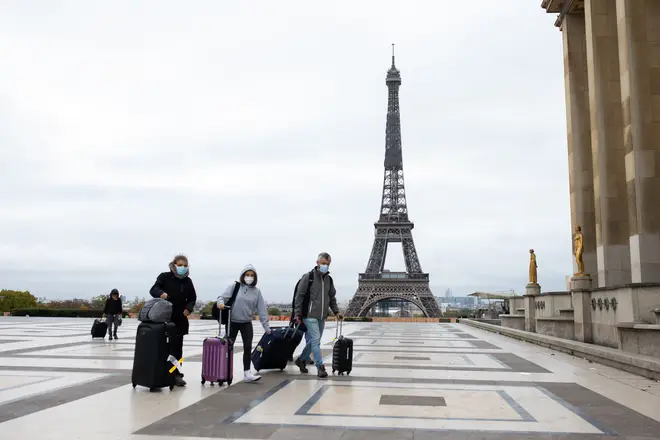
Clive Bull 1am - 4am
9 November 2020, 14:42

Several European countries have imposed new restrictions in the face of soaring coronavirus infections, hospitalisations and deaths.
Portugal and Hungary are the latest to impose curfews against the resurgent tide of the virus hitting the continent and filling its hospital wards.
Like other European countries, Portugal has imposed a state of emergency and ordered some seven million people - around 70% of its population - to stay home on weekday nights from 11pm to 5am for at least the next two weeks.
Hungary also imposed its strictest measures so far as Prime Minister Viktor Orban announced an 8pm-5am curfew, except for commuters going to work. All businesses must now close by 7pm.
Read more: Half of coronavirus cases in UK still not being identified, expert warns
Read more: October ‘worst month of pandemic’ as cases approach 50 million worldwide
"I know, we all know, that this will not be easy. The next weeks will be difficult. But the vaccine is within sight, we've got to hold out until then," Mr Orban said.
Other measures in Hungary mirrored those becoming familiar across Europe as the virus surges, including limits on eateries, sports events and family gatherings.
Unlike the UK, the country has adopted remote learning for school and university students, with restrictions due to kick in on Tuesday at midnight and remain in place for at least 30 days.

Boris Johnson outlines restrictions for second national lockdown
But there are glimmers of hope emerging from France, the Czech Republic and Belgium that tougher restrictions might be starting to work.
The French government has rapidly responded to soaring virus numbers, from localised curfews and closures of bars and other businesses in specific areas a few weeks ago to what is now a full nationwide lockdown, albeit with schools and essential businesses still open.
Health Minister Olivier Veran said early indications are that the measures may be starting to slow the latest surge and that it would "have flared up faster and stronger" without them.
Read more: Wales emerges from firebreak lockdown under new national restrictions
Read more: Police clash with anti-lockdown protesters in Manchester city centre
Belgian health authorities are also confident that the hard-hit country's partial lockdown has seen the peak of hospital admissions come and go.
Some 6,948 virus patients are being treated in Belgian hospitals now, down by about 500 patients from 3 November.
Infections in the Czech Republic have started to decline after a two-month rise to record high levels and the number of people in hospital also dropped below the 8,000-mark.

LBC speaks to first people in the queue for mass testing in Liverpool
All eyes are now on a vaccine which Pfizer announced on Thursday had a 90% success rate in trials so far.
The UK has preemptively ordered batches of several worldwide vaccines undergoing trials, including 10 million doses of the Pfizer and BioNTech vaccine to inoculate frontline health workers, the elderly and the most vulnerable as soon as it is approved.
It has been tested on 43,500 people in the US, Germany, Brazil, Argentina, South Africa and Turkey.
Pfizer hope to supply 50 million doses by the end of 2020 and around 1.3 billion by the end of 2021.
Read more: Pfizer's major breakthrough as Covid-19 drug '90% effective'
A shipment of Russian coronavirus vaccine is due to arrive in Hungary in December to undergo final tests, and the Government announced that larger deliveries are expected in mid-to-late January.
It is unclear whether the vaccine will be a success, with the Russian Government pushing through approval for a Covid-19 vaccine as early as August.